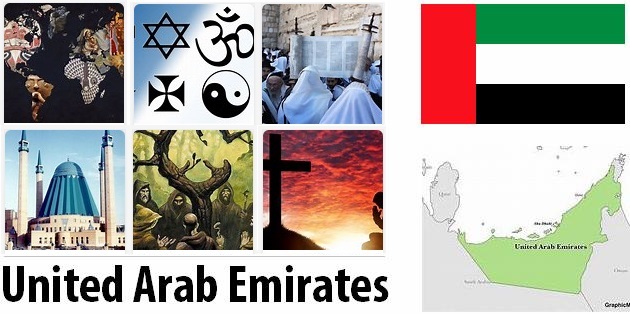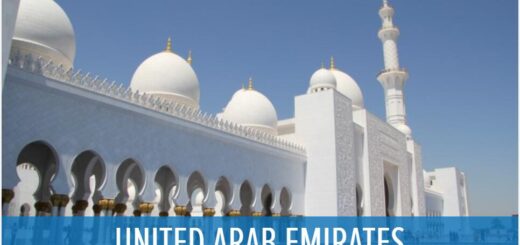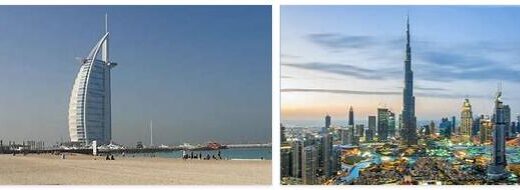United Arab Emirates Religion
Islam is state religion and the country’s legislation is based on Islamic Sharia law, which is based on the Qur’an. The majority of citizens are Sunni Muslims.
Many emirates profess Wahhabism, which is a strongly Orthodox and Puritan direction, with its center in Saudi Arabia. However, Islam’s injunctions are not interpreted as strictly in the United Arab Emirates as in the neighboring country.
The second largest religious group is the Shia Muslims. They often have an Iranian connection and the majority live in the Emirates Dubai and Sharjah. For Sunni Muslims, the regime appoints church leaders, while Shia Muslims have their own bodies that handle religious issues.
In the country there are also minorities of mainly Christians, Hindus and Sikhs. Religions other than Islam are tolerated, but it is forbidden to mission. Christians have been arrested and expelled because they are believed to have spread Christian propaganda. On the other hand, there are meeting rooms for the religious minorities that have been built on royal land. When the head of the Catholic Church, Pope Francis visited the emirate in 2019, an outdoor mass was held at a large sports arena in Abu Dhabi.
- Countryaah: Population statistics for 2020 and next 30 years in United Arab Emirates, covering demographics, population graphs, and official data for growth rates, population density, and death rates.
2019
December
Relatives of regime critics are punished
December 22
Authorities in the emirate are punishing regime critics by revoking passports or bribing opposition relatives with travel bans, according to a report by Human Rights Watch. At least 19 relatives of regime critics have been taken off their passports and at least 30 are not allowed to leave the country. Other forms of harassment also occur, such as limiting their access to jobs and education.
November
European strength to French base
November 24
A European naval force designed to protect ship traffic in the Persian Gulf will be stationed on a base that France has in Abu Dhabi, French Defense Minister Florence Parly said. She does not state which countries should contribute to the force.
New term of office for Sheikh Khalifa
November 6
The ruler of the richest of the emirates, Abu Dhabi, continues as president of the United Arab Emirates federation. Schejk Khalifa’s fourth term in office is approved by the Supreme Council. Since the Sheikh has been ill in recent years, his brother, Crown Prince of Abu Dhabi, is believed to be exercising real power.
September
First emirate in space
September 25
Hazza al-Mansoori, 35, is suspended in space from the Bajkonur base in Kazakhstan. The same space crew includes American Swedish Jessica Meir and a Russian cosmonaut. The Emirates, which has a background as a combat pilot, will stay eight days at ISS, the International Space Station. However, he is neither the first Arab nor the first Muslim to make a spacewalk. A Saudi pilot who participated in a voyage with a US space shuttle in 1985 is now Minister of Space Research (see March 19, 2019).
The United States is reinforcing the Persian Gulf
September 20
The United States announces military reinforcements to the Persian Gulf in the wake of attacks on Saudi oil facilities that Iran is accused of carrying out on September 14. Shortly before the announcement, President Trump also tightened US sanctions on Iran. The reinforcements to be sent to the region, at the request of Saudi Arabia and the United Arab Emirates, are about aerial and robotic defense, says new Defense Minister Mark Esper.
July
Trump veto keeps gun deals going
July 24
President Trump vetoes three different resolutions in the US Congress created for members to stop arms exports to Saudi Arabia and the United Arab Emirates, countries that are both active in a war on dominance in Yemen. Arms exports must be kept in motion, partly because gun buyers are important allies to the United States, Trump writes to the US Senate congress.
Emirates soldiers home from Yemen
July 10
The United Arab Emirates participates in the civil war in Yemen, against the Houthi rebels, with its own troops and has trained about 90,000 Yemenites militarily since 2015. But now the Emirate announces that its military presence will decrease, soldiers withdrawn mainly from northern Yemen. In the past, emirates have been criticized for how prisoners are treated in Yemen and accusations of war crimes have occurred (see November 27, 2017). With the retreat, the Emirate is at risk of clashing with Saudi Arabia, whose southern border is employed by Yemeni Houthis.
Full foreign ownership of companies is allowed
July 2
The government has decided to remove the restrictions on foreign ownership in companies. So far, an emiratic partner as a majority owner has been required, but now full ownership from abroad is allowed (see October 30, 2018).
Prime Minister’s wife on the run
July 2
Jordanian Princess Haya, who is one of several wives of the Emir of Dubai, takes up a fight through the British court for custody of the two children and for a ban on contact directed at her husband. Husband Muhammad Al Maktum is the Prime Minister of the United Arab Emirates, and the case is likely to be troublesome for the British Government, which is keen to maintain good relations with the Emirates. For Jordan, it can have consequences, even if it is seen as a private matter between two royal houses. Haya is half-sister to the King of Jordan, and about a quarter of a million Jordanians support their families through work in the Emirates. The Emir’s adult daughter Latifa tried to escape from Dubai 2018, but was captured. It has not been known what has happened to her ever since. Also in 2000, one of the emir’s daughters, Shamsa, tried to leave her princess’s life but was brought back.
June
New part victory for Qatar in UN court
June 14
Two years after the neighboring countries gathered to boycott Qatar, the country wins a new part victory in the International Court of Justice in The Hague, which is part of the UN system. In a dispute between Qatar and the United Arab Emirates, the court says no to a request for certain time-limited measures against Qatar. Last year, the court ruled that the Emirates must allow the reunification of families where any member is a Qatari and that Qatari students must be allowed to complete their studies in the Emirate.
May
Defense agreement with the United States
May 29th
A defense agreement between the Emirates and the United States comes into force.
Gold-lined visa for investors
May 21
A first group of about 6,800 investors are granted permanent residence permits in accordance with the emigration’s new migration rules. Highly educated foreign workers should now also be able to obtain permanent permits. The United Arab Emirates is said to be the first country in the region to ease the rules, otherwise guest workers are granted time-limited and highly regulated permits through a system called Kafala. Within the EU there are several countries that even reward investors with passports.
Mysterious sabotage against ships
May 12
Four tankers are being sabotaged outside the Fujayra emirate, near the Hormuz Strait, which is the entrance to the Persian Gulf, where there are, among other things, Saudi and Iranian oil ports. Two of the vessels are Saudi, one Emirate and one Norwegian. No one is identified as responsible, but many theories circulate: everything from Iran being behind the sabotage to being carried out by someone who just wants charges against Iran, so that it provides a pretext for attacking Iran militarily. The event takes place in a state of great tension between Iran and the United States, which among other things has sent warships to the area.
Weapons from the Emirates in Libya?
May 2
A robot of Chinese manufacturing has been identified by UN expertise following attacks against suburbs of Libya’s capital Tripoli in April. The city is employed by forces from the east under General Haftar, who does not accept Libya’s internationally accepted government. The robot type is used only by China, Kazakhstan and the United Arab Emirates, which is why the expert panel – which puts forward its conclusions in a report to the UN Security Council – suspects that forces on Haftar’s side have gained access to robots via the Emirates. The robots are believed to have been fired using drones. Deliveries of the weapons system violate the arms embargo on Libya introduced by the UN in 2011.
April
New tourism initiatives underway
April 30th
Dubai announces plans for new infrastructure projects with links to tourism, including a cabin line that will extend across the emirate’s main road, bicycle and walking routes and a system of rental bicycles. A bridge with a garden – an international trend in urban planning – will also be built. The estimated total cost will not be published, nor when it will be clear, but in 2020 Dubai will host a world show that is expected to attract a large audience.
Support for Sudan’s military rule
April 28
The United Arab Emirates and Saudi Arabia are taking steps to support Sudan’s central government after the country’s longtime leader Omar al-Bashir has been forced out of power. In total, they promise three billion dollars. 500 million will be deposited with the Central Bank of Sudan to support the country’s currency, while 2.5 billion will secure food, medicines and oil products. Lack of currency – dollars – is one of the factors that fueled a popular wave of protests against the regime in Sudan. The Gulf states have expressed support for the military leadership that has taken over; it has so far opposed the demands of a civil, democratically elected government.
Innovation without a minister
April 23
“Ministry of Opportunities” is set up – a ministry without a boss, but where the entire government apparatus is to participate. The Prime Minister calls it a new, virtual way of working. One of the purposes is to shorten the processing times, it is called. This takes place two and a half years after the emirate has been appointed as “happiness and tolerance ministers” (see February 2, 2016).
Death penalty for robbery
April 19
Eight Nigerians are sentenced to death for a series of armed robberies in 2016 against, among other things, value transport and exchange offices in the Emirate of Sharjah. According to media, they had convicted visitor visas. Of the originally 20 suspects, nine were convicted.
March
Regional space program is created
March 19
Eleven Arab countries have agreed to establish a joint space program. The researchers who will work with the program are based in Abu Dhabi. The first project will be an Arab satellite (see October 29, 2018). The Emirates also already has four spacecraft queues. The first will take part in a trip to the International Space Station ISS starting September 25 (see September 3, 2018). Sultan bin Salman Al Saud, who took part in a space mission in 1985, is considered the first Arab in space.
Emirates on the EU blacklist
the 12th of March
The United Arab Emirates is once again placed on the EU list of states considered to be a tax haven and deemed to facilitate tax evasion from other countries. This means that the control of financial transactions with the Emirates is increased. Italy raises objections that can be seen in light of the fact that the emirate has made major investments in the Italian economy.
February
The Pope visits the emirate
February 3
Pope Francis lands in Abu Dhabi for a historic three-day visit. This is the first time the head of the Catholic Church is visiting the Arabian Peninsula, where there are mainly guest workers from Asia who are Catholics. All countries in the region except Saudi Arabia allow churches, that is, closed Christian gatherings in their own shrines, but they do not accept Christian mission. Francis’s visit ends with a trade fair in a sports arena, which is granted as the visitors are far more than what is held in the local church. The Pope also meets among other leaders from al-Azhar in Cairo, the Sunni Muslim world’s foremost educational institution. The statements from meetings and fairs are about religious freedom, civil rights and hopes for peace in Yemen, Syria, Iraq and Libya.
January
Death penalty for murder of boy
January 14
A Pakistani is sentenced to death for rape and murder of an 11-year-old boy in Abu Dhabi 2017. The boy’s parents – Pakistani father and Russian mother – have been asked according to local media if they are prepared to receive blood money and let the perpetrator live. The parents request that the man be executed. The death penalty must be approved by President Khalifa.



